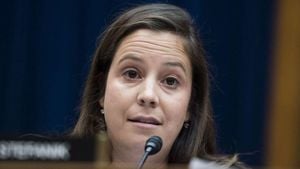Global inflation has been making headlines lately as countries grapple with rising prices fueled by various factors, including government policies, supply chain disruptions, and geopolitical tensions. The economic environment has seen substantial shifts, particularly with recovery efforts following the COVID-19 pandemic, which has left many nations struggling to find their equilibrium.
Take the United States, for example, where the Federal Reserve has been trying to combat inflation by raising interest rates. These hikes have created tension within the markets, as many industries are feeling the pinch. The crux of the issue lies not just with consumers but also with businesses facing increased costs and squeezing profit margins, which can lead to layoffs and reduced hiring.
According to World Bank Chief Economist Roberta Gatti, the recovery of many economies hinges on controlling inflation, managing debt, and improving investment prospects. She noted, "Countries must find the right balance to stimulate growth without exacerbation of inflationary pressures. This is particularly important for developing markets, which face greater vulnerability." This balance becomes even trickier when considering multiple factors affecting economic stability.
Globally, inflation has moderated from its peak but remains at concerning levels. Gatti indicated the World Bank's latest global forecast expects inflation to slow to 3.5 percent this year, with hopes of it reducing even more to 2.9 percent by 2025. Yet, she stressed the importance of recognizing the disparities among different regions. For example, countries like Iran are projected to experience inflation skyrocketing to 31.9 percent next year, contrasting sharply with improvements seen elsewhere.
Meanwhile, Argentina has been making headlines by managing to lower its inflation rate to 2.7% last month, the lowest it’s seen in three years. President Javier Milei has marked controlling inflation as his administration's top priority. Under Milei, the drop below 200% annual inflation is seen as progress, though many still recall the trials the country faced just months prior.
On the opposite side of the globe, Russia continues to face significant inflationary challenges, with rates hitting 9.8% as of September. This uptick is attributed not only to economic sanctions stemming from its invasion of Ukraine but also to increasing production costs exacerbated by supply shortages. The government has responded by raising interest rates to as high as 21%, aiming to suppress inflation but also putting additional strain on many businesses.
Such drastic measures, though intended to stabilize the economy, are criticized by business leaders who warn of potential bankruptcies due to high borrowing costs. They argue these economic conditions lead to stifled growth and investment, which can deepen the crisis.
Simultaneously, discussions have arisen about price controls as potential solutions to combat inflation. Historical examples tell us, though, this approach can backfire. Price fixing can distort supply and demand, leading to shortages and black markets, as seen during bygone eras of economic turmoil. Rather than settle the inflation issue, price controls may only mask the underlying economic problems.
The interplay of inflation, interest rates, and government policies resonates heavily across various economies, each grappling with unique challenges. While some regions are finding ways to stabilize and improve, others are struggling to find footing as prices rise without respite.
Trade and investment will remain focal points of recovery efforts, with analysts underscoring the importance of fostering environments conducive to economic growth. This includes the need for cautious approaches to monetary policies and regulations, which, if not aligned correctly, could usher back the inflation fears nations are fighting so hard to manage.
For many economists, the narrative is clear: successfully addressing the inflation puzzle means balancing consumer protection measures with fostering markets where innovation and growth can thrive. The road to recovery may be long and arduous, but leveraging global cooperation and focused economic strategies could be the key to overcoming the current inflationary spiral across the globe.
Overall, as the world watches and waits to see the results of respective nations' approaches to inflation, it’s evident the repercussions extend well beyond borders—marking these economic discussions as pivotal not only to local economies but to the entirety of global commerce.



